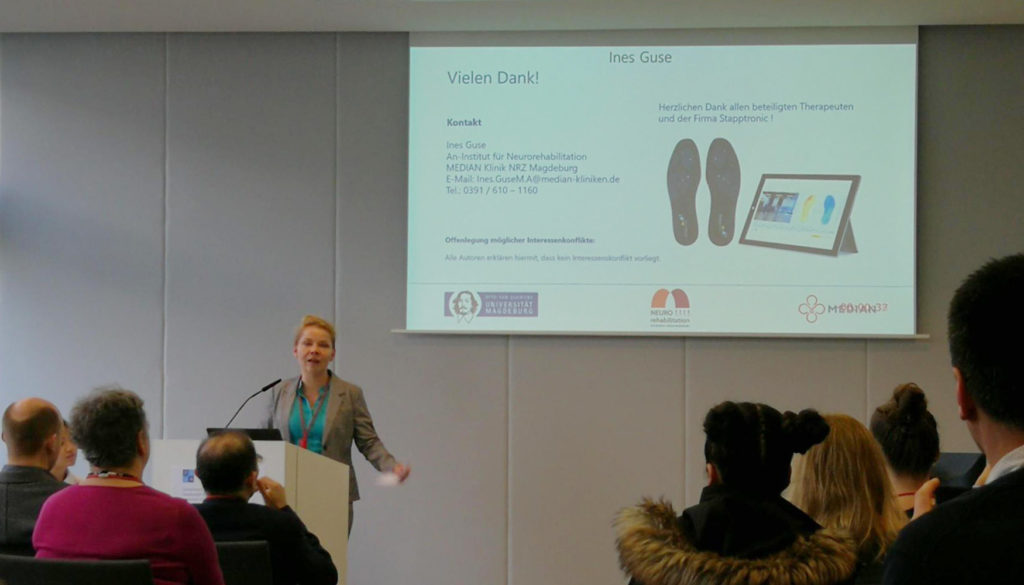Study: Sole sensor technology in neurological rehabilitation

The aim of this study was to determine whether the stappone insole sensor technology could be effectively applied in the routine care of inpatients undergoing neurological rehabilitation. The study was conducted in collaboration with the MEDIAN Clinic NRZ Magdeburg and the MEDIAN Clinic Flechtingen. The findings were presented by Ines Guse, a research associate at the An-Institute for Neurorehabilitation at Otto-von-Guericke University Magdeburg, during the joint annual meeting of the German Society for Neurorehabilitation in Augsburg in December 2023.
Rehabilitation as the key for mobility
One of the primary goals in neurological rehabilitation is the restoration and enhancement of mobility. Through the insole sensor technology of stappone, individual parameters such as step length, frequency, changes in walking speed, and pressure distribution can be easily captured. This enables the recording of parameters far exceeding conventional time and distance measurements. The ability to collect such detailed data opens new perspectives for personalized therapy recommendations and a more objective assessment of patients. Another currently unexplored objective is the more objective and accurate evaluation of rehabilitation progress.
Objectives of the Feasibility Study:
- Implementation of Sensor Insoles in Neurological Rehabilitation: The study aims to investigate the use of stappone sensor insoles as aids in neurological rehabilitation. This involved examining the practicality of the sensor insoles and their control through the tablet in daily routine use.
- Assessment of Patient Acceptance: Patient feedback was systematically documented, recognizing that comfort plays a crucial role in user-friendliness and, consequently, performance.
- Evaluation from the Therapists’ Perspective: The study examined therapists’ perspectives on the user-friendliness and handling of the devices in routine operations. Additionally, the study explored the integration of these devices into the broader rehabilitative process and their contribution to assessments.
Methodology: Duo-centric study with Stroke and Multiple Sclerosis Patients
The duo-centric study focused on stroke and multiple sclerosis patients, conducting standard gait assessments using stappone sensorsoles. In addition to the assessments, written surveys were administered to both patients and therapists, and verbal interviews were conducted.
The evaluations of the sensor insoles varied between patients and therapists. For therapists, the assessment heavily depended on the ease of use and seamless technical execution of the examination. Crucial criteria for a positive evaluation included swift pairing of the tablets with the sensor insoles, no interruptions in data recording and rapid data transfer from the sensors to the tablet. Patients were asked about their perception of the insole, particularly whether it restricted their walking and if the insole elicited any negative perceptions.
Assuming a flawless technical functionality of the sensorsoles and the associated tablet, there is a promising approach for quantifying the gait and making a positive contribution to mobility rehabilitation in the field of neurological rehabilitation.
The study’s findings indicate that the successful implementation of devices for measuring and quantifying functional states, particularly walking, hinges on meeting all technical prerequisites for straightforward and prompt application or execution. Once this foundation is in place, the technology presents compelling opportunities for advancing the neurorehabilitation of walking and, by extension, enhancing mobility in neurological rehabilitation.
Do you have any questions about using stappone products? Get in touch with us! We will be happy to help you at any time.
Werden Sie jetzt Teil unserer LinkedIn Community und erfahren Sie regelmäßig Neuigkeiten von stappone, Technologie und Medizin!

